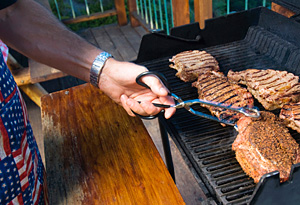Safe Grilling Strategies

Photo: Creatas/Thinkstock
What's the unofficial first day of summer? For TheBestLife.com lead nutritionist Janis Jibrin, MS, RD, it's the first time she catches a whiff of the familiar smoky smell of her neighbor's dinners wafting into her window. It's also a reminder of the joys—and perils—of grilled food.
While grilling is an incredibly lean way to cook, it does have a dark side. Cooking food over a high, open flame can produce carcinogens, or cancer-causing substances. Before you give up on grilling, there are a few ways you can safeguard yourself and still have your grilled chicken, burgers and other summer favorites.First, let's take a look at what's happening with your food. Throwing your grub on the grill can cause:
Heterocyclic Amines (HCAs)
Combine muscle meat with intense heat, and you'll get a chemical reaction that results in the production of these compounds. They're not just found in barbecued meats, though. Pan-frying, electric grilling or broiling can also produce HCAs. So steer clear of blackened and charred meats. Or, opt for plant-based foods, such as vegetables or tofu; they don't contain these chemicals.
Polycyclic Aromatic Hydrocarbons (PAHs)
You'll find these compounds in barbecue smoke. Anything that makes the grill smokier—like fat that drips from the food and hits the coals or flame—produces even more PAHs. Then, the chemical-laden smoke gets absorbed by your food. Unfortunately, these are equal-opportunity chemicals, affecting meats, veggies and bread.
But don't hang up your spatula just yet!
As a reminder, always consult your doctor for medical advice and treatment before starting any program.



